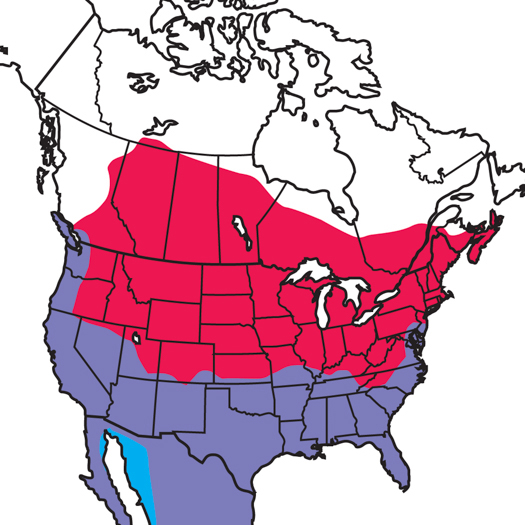Hi Vince
PB grebes certainly are fascinating. They have a hugely extensive range in North and Central America, the most extensive of any North American grebe species. Within this extensive range are both resident and migratory populations. PB grebes are strictly aquatic birds. Of particular note regarding their adaptation to an aquatic lifestyle is that (as with grebes in general) their legs are situated far rearward on their body. This is a great adaptation for paddling about on the water and for propulsion during a dive but it’s an extremely poor anatomical arrangement for walking on land (this makes them very clumsy at walking; they’re simply not built for living on land). Because of this (and of course, the fact that they obtain their food from bodies of water—fresh, brackish and saltwater) they must stick to bodies of water. Thus, as with other types of strictly aquatic birds, the PB grebes that seasonally live and breed in areas where the types of bodies of water that they utilize freeze over during the colder months must seasonally move away. However, in regions where utilized bodies of water only occasionally and temporarily freeze over while other suitable bodies of water in the area remain unfrozen (as is the situation in the area of New Mexico where I live) then the grebes may not migrate out of the area. One other possibly relevant point regarding your lake situation is that breeding PB grebe pairs will setup and actively defend a territory in suitable habitat during their breeding season. Another point to keep in mind (notably, with respect to resident populations) is that there are particular bodies of water in which the habitat is suitable for daily living but unsuitable for breeding/chick rearing. So, in such cases you may see PB grebes living there outside of the breeding season but not during the breeding season when they have moved away to bodies of water that contain suitable breeding/chick rearing habitat.
I conducted a study on the chick rearing process of PB grebes so I developed a special affection for this species. I came to know the two PB grebe families (and each individual family member) that were the subjects of my study quite intimately. It was a unique and fascinating study and I wrote a book about it. If you’re interested in learning more about this species you might consider checking it out. If interested, the book is available through Amazon (the title is Life and Loss Among the Reeds: A Tale of Two Pied-Billed Grebe Families). Somewhat surprisingly, as far as I am aware, this is the only book out there that deals with aspects of the behavior and ecology of the PB grebe as the main subject. However, there are some books about grebes in general that include a chapter about the PB grebe and you might even be able to find one of these in your local libraries.






